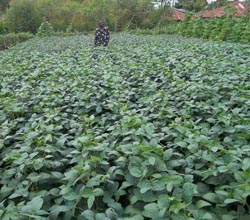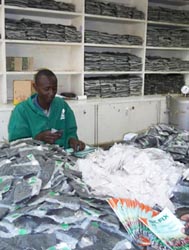In Kenya the five main objectives are 1) expanding awareness of BNF technologies, 2) dissemination of proven BNF and grain legume production technologies, 3) conduct training in BNF technologies, 4) design field demonstrations of N2Africa best practice that are conducted by others, and 5) backstop Kenya’s inoculant industry. Here is a brief description of our approach to each objective.
Expanding awareness of BNF technologies
Awareness of BNF technologies was promoted through a three-day stakeholder meeting attended by 36 participants (33% women) representing 32 organizations including five private sector interests. This meeting served as a clearinghouse for technologies from four projects relating to BNF and grain legume technologies. At the request of its partners, N2Africa designed and printed 12,000 one-kg paper bags for KINOKO brand soy flour. These packages are fully compliant with Kenyan regulations, include a certified bar code for ease in retail sales, and cooperators are expected to meet our standards before they may fill these bags with their milled soyabeans. Presently, five cooperators have done so.
Dissemination of proven BNF and grain legume production technologies
In Kenya, the lead party through which we indirectly disseminate the N2Africa best practices is the Western Regional Agricultural Technology Evaluation (WeRATE), an umbrella organization of 22 farmer associations and other stakeholders. In addition, eight one-stop BNF technology shops were established. These shops sell improved grain legume seed, inoculants and blended fertilizers.
Alongside the above, a new area with huge potential for expansion of soyabean production was identified in Kuria, and incentives offered to a new farmer association started there. Furthermore, N2Africa continues to produce and distribute branded bags to its partners, in this case 4,000 fifty-kg woven polythene grain sacks, 2,000 twelve-kg woven seed bags and 4,000 two-kg two-ply paper seed bags. Just as this article is being prepared, an order was received for 200 tons of soyabean and logistics for this opportunity are being formalized though appointing a short-term marketing officer.
Conduct training in BNF technologies
Training in BNF technologies and grain legume enterprise continues. It now focuses upon extension agent liaison skills, grain legume marketing and legume processing, with 47 trainees scheduled for 2014. Training relies upon extension materials developed during Phase 1, with 4500 copies of the "green booklets" reprinted and distributed through various means. N2Africa Master Farmers now lead training in BNF technologies organized by other organizations using N2Africa’s training materials (the abovementioned green booklets).
Design field demonstrations of N2Africa best practice that are conducted by others
Technology demonstrations were installed during both the 2014 long rains and the 2014-2015 short rains. Farm input suppliers donated seeds, inoculant and fertilizers. Special thanks are extended to MEA Fertilizers, SeedCo and Western Seed Company!
During the 2014 long rains, seven field demonstrations were conducted with N2Africa soyabean best practice involving rust tolerant varieties inoculated with BIOFIX and fertilized with Sympal. The demonstrations were conducted across the West Kenya Action Site and served as the focus for farmer field days in June. In addition, seven soyabean variety tests were conducted, with SC Squire emerging as the best performing variety.
During the 2014-2015 short rains 86 technology tests were installed. These demonstrations were supported by N2Africa (25 sites) as well as three other projects with interests in legume management; the Humidtropics Program (25 sites), NIFA Better Beans (18 sites) and IFAD-Cassava Intercropping (18 sites). Field protocols for these tests are available on request.
 |
Left: Farmers working with N2Africa have mastered soyabean production using recommended disease-resistant varieties, inoculants, fertilizer and spacing as illustrated by the performance of SC Squire at Ongai Farm, Vihiga Right: Recovery of cured BIOFIX inner packages prior to sealing into outer sachets. Every batch of BIOFIX undergoes independent quality inspection by MIRCEN-Nairobi under arrangements with N2Africa. |
 |
Backstop Kenya’s inoculant industry
N2Africa continues to work closely with the University of Nairobi MIRCEN by supporting quality control testing of every batch of BIOFIX inoculant produced by MEA Fertilizers at its Nakuru factory. Every batch contains in excess of one billion rhizobia per gram of inoculant, but contaminants, mostly fungal spores, are on the rise. Therefore, quality control remains very important.
Meanwhile, MIRCEN is working with COMPRO through funding by NIFA to conduct molecular characterization of its four best NAK isolates for both bean and soyabean. Some of these candidate elite isolates (e.g. NAK 117 and 135) were shown to be the same strain, but in general the best strains were shown to be distinct from one another and their counterpart industry standards.
Finally, MIRCEN is also examining some lower cost culture media for its best NAK rhizobia, including substitution of yeast extract and mannitol for lower cost substitutes. More information on this development will follow in later articles.
The story continues
So progress by N2Africa continues in Kenya. Our ability to foster dissemination largely relies upon the commercial availability of improved BNF technologies and the interests of Kenyan farmer associations and other’s innovation platforms in grain legume enterprise. We have attracted participation by other developmental research projects as well, and now coordinate our joint efforts through a novel technology clearinghouse approach. One emerging issue is that when others conduct BNF technology tests under our guidance, they are no longer obligated to collect data on our behalf. To solve this, we have recently recruited a fulltime farm liaison officer to assure that important information from these on-farm activities are not lost.
By Paul L. Woomer (Kenya Country Coordinator), Macdonald Wasonga (WeRATE Chairman) and Nancy K. Karanja (MIRCEN-Nairobi Director)
